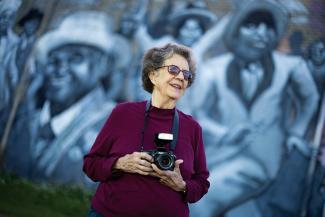Many colors flash through the mind when thinking of New Orleans culture. The vibrant, exuberant colors of celebration — bold reds, majestic purples, striking metallics. Judy Cooper (NC ’59, G ’69) found the city’s visual resplendence intriguing from the start, leading her to a long career in local photography that would eventually cumulate into her new book, Dancing in the Streets (The Historic New Orleans Collection, 2021).
Impression: Judy Cooper
Many colors flash through the mind when thinking of New Orleans culture.
Many colors flash through the mind when thinking of New Orleans culture.

A Birmingham, Alabama, native, Cooper chose Tulane for her undergraduate studies in literature. After graduation, she earned a master’s degree at Columbia University in New York before returning to Tulane to pursue a PhD. Cooper then taught French at Loyola University until the early 1970s when photography captured her interest. She realized New Orleanians were particularly fascinating and colorful subjects, most of all, the members of social aid and pleasure clubs. In the late 1990s, she embarked on a decadeslong journey documenting the clubs’ unique artistic expression.
“I started photographing the weekly parades, because I thought they were visually colorful, full of movement, and joy and celebration. But after a few years of following them, I got to know people and talk to them. And I began to hear about the long and complex history of the tradition. And I thought, well, this deserves a book,” Cooper said.
Cooper did not start concretely thinking about Dancing in the Streets until after Katrina. The thought of the clubs being a part of a past that had been threatened with extinction inspired her to create a published tribute to the culture. When the parades began again, she set about capturing the colorful spirit of the clubs with a new purpose.
“This is a culture that is so rich. It’s a culture that’s rooted in family and tradition and the interconnectedness of all the parties, sharing this fun thing that they all do together,” Cooper said.
Cooper said that in recent years, more and more people are coming to New Orleans and experiencing the customs of the second-line community. She hopes that Dancing in the Streets will also serve as an introduction of the social aid and pleasure clubs to the rest of the world.
“I do hope that people from not just New Orleans, but from outside New Orleans, will get to see it and read it and see the richness of the culture — and the joy,” Cooper said.






























































